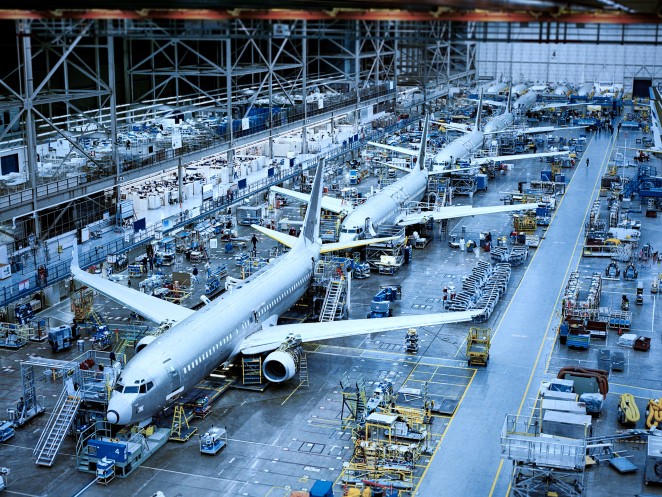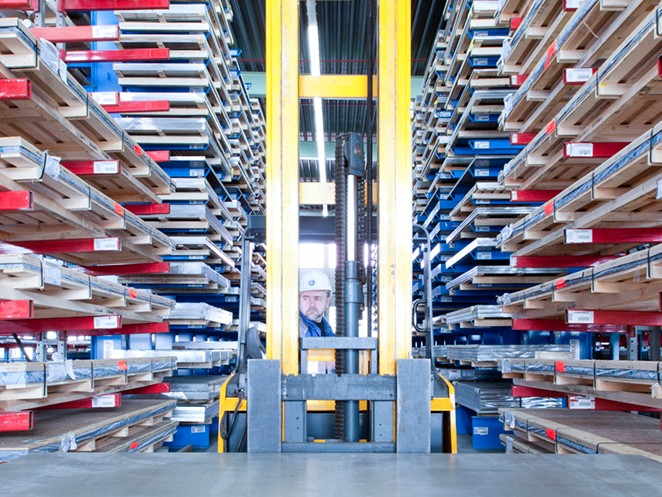System integrator for global organization of the entire supply chain
Air traffic is increasing by around five percent every year – a challenge for the aircraft industry. Solutions focus on enhancing the time- and cost-efficiency of the entire supply chain and coordinating global material shipments on a centralized basis.
A Boeing 747 is put together from millions of parts, like a gigantic jigsaw puzzle. A strict procedure has to be followed in which each step leads into the next. A wheel suspension delivery that’s just slightly late or a missing door handle can hold up an entire production line.
Tight schedules are a major challenge for all aircraft manufacturers. This is especially true if each supplier has to source its own raw materials, as was the case at Boeing until 1998. Since then thyssenkrupp Aerospace has been exclusively responsible for managing the supply chain for all aluminum and titanium parts. The contract with Boeing is the most extensive of its kind in the global aircraft manufacturing sector. Altogether thyssenkrupp Aerospace operates over 42 aerospace service centers in 19 countries on five continents.
The idea is simple: Boeing is the owner of the raw material. This is sold on to suppliers at prices agreed on a long-term basis, which increases planning reliability. Patrick Schatz, Vice President in Seattle, says: “As a system integrator, we manage the entire supply chain, reduce complexity and coordinate the supply of materials on a centralized basis. More than 500 Boeing suppliers from all over the world turn directly to us for metals.”
Every day we receive more than 3,000 inquiries: From Mitsubishi in Japan, where the wings for the new Dreamliner (Boeing 787) are built, to the center in Kansas that manufactures parts for the Boeing 777 door mechanism. In urgent cases an order is completed in just four hours, the material cut to size, packed and shipped.
Everything in stock
thyssenkrupp stocks all the required materials, from 0.25 millimeter thin metal sheet to 25.4 centimeter thick plates and profiles in various grades and compositions. “To operate as efficiently as possible we calculate the exact requirements in advance,” says Schatz. “We have a very successful planning department which uses specially developed forecasting systems to enhance visibility in inventory management. Web-based IT solutions are employed to keep customers up-to-date with accurate information. Our team of statisticians and analysts receives production and sales data from Boeing, checks these against comparable data from previous years, monitors ongoing orders and adjusts inventory levels accordingly. This ensures that we can provide a reliable service for our customers.”
Reliable, efficient and cost-effective. thyssenkrupp’s motto is “Cut to size, just in time”. Previously customers had to hold stocks, purchase entire sheets or plates and cut them to size themselves. The scrap produced impacted overall costs. Today thyssenkrupp cuts the metal to size in its warehouses. Increasingly our engineers in Seattle even develop detailed cutting patterns in the shape of the finished product. The blanks are then cut out using computer-controlled water-jet cutters and sent to the suppliers. Waste is sorted by type and recycled. This conserves resources and saves a great deal of energy.
Boeing is highly satisfied and has extended its contract with thyssenkrupp until 2018. The trend in the aerospace industry towards substituting fiber-reinforced composite materials for aluminum doesn’t worry thyssenkrupp. “We see ourselves primarily not as a materials supplier but as a supply chain optimizer. We can apply our expertise to other materials and also to finished parts whenever necessary,” says Schatz. “Changes are a key part of our work. It’s our job to stay one step ahead.”


